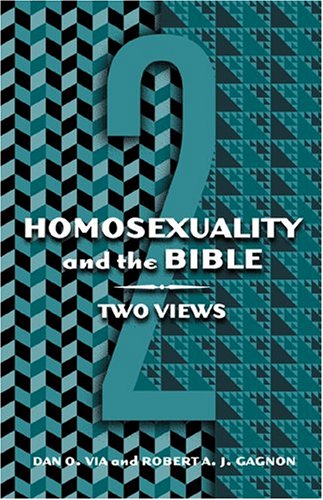Book Notes
 Dan O. Via and Robert A.J. Gagnon, Homosexuality and the Bible; Two Views (Minneapolis: Fortress Press, 2003), 117pp.
Dan O. Via and Robert A.J. Gagnon, Homosexuality and the Bible; Two Views (Minneapolis: Fortress Press, 2003), 117pp.
In this short book two New Testament scholars present contrasting views on the matters related to gays and the Gospel. Via, professor emeritus at Duke Divinity School (United Methodist Church), argues for a view that embraces gays, whereas Gagnon, associate professor at Pittsburgh Theological Seminary (Presbyterian Church USA), takes a traditional stance. Each author is allotted a forty-page chapter, and then a five-page response to the opposing view. Gagnon, who previously published a 500-page tome on the subject, The Bible and Homosexual Practice (2001), also offers readers extensive additional material to his contribution at http://www.robgagnon.net.
The place of homosexuality in the church is fraught with difficulties. It deals with something deeply fundamental to personal identity, our sexuality, an intensely private matter that is now public fodder for discussion and argument. Thorough analysis of the issues cuts across a broad array of disciplines—history, biology, genetics, psychology, therapy, the role of human experience in interpreting Scripture, and church politics, so "we have a topic that is delicate, sensitive, complex, divisive and important" (p. 1).
There are four passages in the Old Testament (Genesis 19:1–29, Judges 19, Leviticus 18:22 and 20:13), and three in the New (1 Corinthians 6:9–10, 1 Timothy 1:10, and Romans 1:21–27) that speak directly to homosexual behavior. All seven of these texts are, as even Via admits, unambiguously and unconditionally negative in their condemnation of homosexual activity. On this the two authors agree (p. 93). Via argues that the Old Testament texts speak of savage gang rape and ritual purity versus uncleanness (rather than of consensual, loving relationships between adults), whereas the New Testament texts construe homosexuality as caused by a combination of God's wrath and human idolatry (rather than as an unchosen orientation or predisposition). If Paul knew then what we know now, says Via, he would have put things differently. Here, a rough analogy would be that we gladly allow current scientific knowledge to correct now discredited flat earth views once thought to be supported by the Bible (p. 24). For Gagnon, the homosexual act, in and of itself, is always inherently wrong, whereas for Via, all ethical acts must be understood within the broader nexus of motives, inner dispositions, possibilities, consequences, means, and the like. It is important to note that he categorically rejects promiscuity, and only argues in favor of relationships that are "loving, consensual, non-manipulative, and faithful" (p. 29). Gagnon rejects the notion that an involuntary predisposition to something (eg, pedophilia or alcoholism) makes it acceptable, or that love is tantamount to tolerance. He accepts the prohibitions at face value.
This is an accessible book that offers a spirited exchange on a crucial issue for the life of the church.


